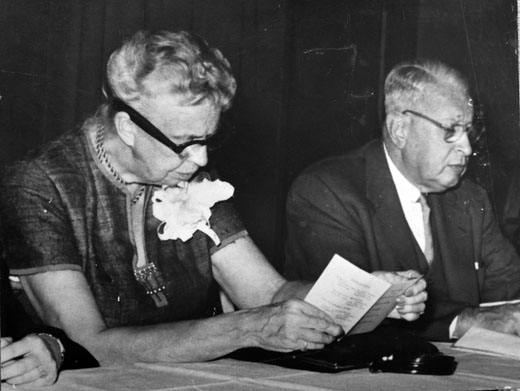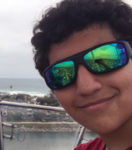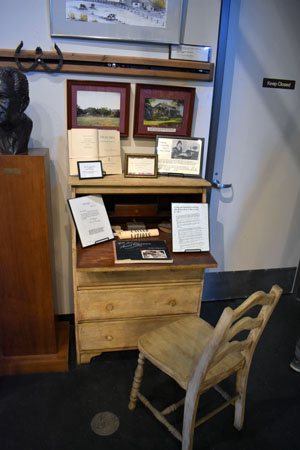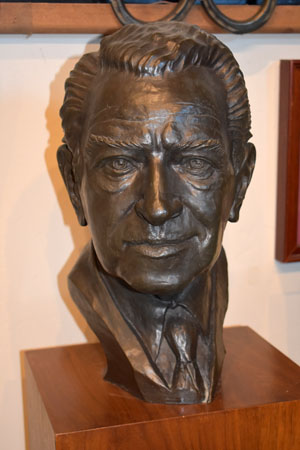
Story by Donald H. Harrison; photos by Shor M. Masori


VALLEY CENTER, California – Not being an incorporated city, Valley Center is not so well known as neighboring Escondido, located about nine miles to its southwest. But, perhaps surprisingly, this rural town has lots of Jewish history—and U.S. presidential history as well.
The Lilac Ranch, also known as Rancho Lilac, was owned by Jewish philanthropist and industrialist Colonel Irving Salomon who was appointed in 1953 and 1958 by U.S. President Dwight D. Eisenhower to serve on the U.S. delegation to the United Nations with Eleanor Roosevelt, widow of former President Franklin D. Roosevelt.
The two developed a strong friendship, so strong that Mrs. Roosevelt was a frequent guest at the ranch, where Salomon and his wife, Cecile, set aside a bedroom in one of the guest cottages for her. Mrs. Roosevelt kept at the ranch a personal writing desk on which she composed installments of her daily newspaper column, “My Day.”

That desk today is housed at the Valley Center History Museum, which is adjacent to the Valley Center branch of the San Diego County Library. On the desk there is an autographed copy of Mrs. Roosevelt’s memoir, On My Own, which dealt with her life after President Roosevelt died and her term ended as America’s First Lady.
An endearing reminiscence of Mrs. Roosevelt was written in ink by Margaret Alheda, the daughter of the Salomon’s cook. A docent at the museum, Lynne Boyett, said Alheda’s written reminiscence left out some background, that being that when Alheda was in school, she had told her classmates that Mrs. Roosevelt was staying at her house. The classmates didn’t believe her, and began to tease her unmercifully. Alheda was crying when she got home, and Mrs. Roosevelt heard about it.
As Alheda remembered the incident, it went like this:
“When I was a little girl I had the privilege of meeting Eleanor Roosevelt who was visiting Rancho Lilac in Valley Center, where I lived as the daughter of the cook. Interestingly Colonel Irving Salomon who owned the ranch and had served with Roosevelt at the U.N., had apparently told her that there was a little girl who very much wanted to meet her. When the school bus stopped at the gate to drop me off, there she was waiting to meet me. Imagine such a generous and wonderful surprise. It was a short visit, only a few minutes at best, but they meant a great deal to me in the years to come because I met her. In my life thereafter, I was inspired by what I learned as I grew up. Of course, as I grew up I had to learn more and more about her and I was inspired to find in her qualities that I could later find in myself…”
Alheda said Mrs. Roosevelt’s willingness to stand up for her beliefs, to advocate for human rights at the United Nations, and for women’s rights and civil rights in the United States, were inspirational.

On the wall of the museum are photos of Colonel Salomon with Eleanor Roosevelt, as well as other leaders, among them U.S. Presidents Harry S. Truman and Dwight D. Eisenhower, U.N. Undersecretary Ralph Bunche, Queen Elizabeth II, and former Illinois Governor and U.N. Ambassador Adlai E. Stevenson.
Bob Lerner, the museum’s historian, told me that the Salomons were not the first Jewish owners of Rancho Lilac. That honor, according to Lerner, belonged to “the Howard family (Russian immigrants who had Anglicized their last name) [and] came to Valley Center from the mine fields of Northern California and helped to establish a working cattle ranch. They were, in fact, Jewish cowboys. The patriarch of the family, Philip Howard, is buried on the ranch. In 1868, the Howard family started to hold Sabbath services on the property and invited others of their faith to join them.”
Today, the 1,000-acre Lilac Ranch is owned by the California Department of Transportation (CalTrans), which acquired it from heirs of the Salomon/ Wolfsheimer family. Irving and Cecile Salomon’s daughter, now deceased, was Abbe (Salomon) (Wolfsheimer) Stutz, who had served as a San Diego City Councilwoman from 1985 to 1993.
According to Lerner, CalTrans has selected a local environmental/conservation organization as the new owner, with an announcement to be made in a couple of months. The Valley Center Historical Society has agreed to serve as “assignee” of an Historical Covenant governing the property, he said.
“It is our hope that one of the historic bungalows on the property will soon start to host High Holiday and Sabbath services for inland North County’s growing Jewish population,” said Lerner, who himself is Jewish.
In another Jewish development in the area, said Lerner, Friends of Chabad Lubavitch has the title to 320 acres of land near the Valley View Casino. What the organization plans to do with the property has not been disclosed.
*
Harrison is editor and Masori is staff photographer of San Diego Jewish World. They may be contacted respectively at donald.harrison@sdjewishworld.com and shor.masori@sdjewishworld.com